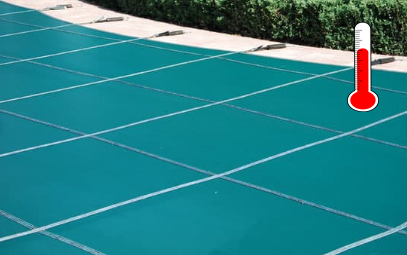When Is the Best Time to Open Your Swimming Pool?
Posted by Michael Hervas on Feb 20, 2020

Updated: February 08, 2022
This winter season is not exactly the ice zombie-infested Long Night that some folks probably hoping for, but we sure are glad that we are but a few weeks away from seeing it end. Spring will be taking over soon, and early spring is going to be a very busy time for us pool owners. Spring brings in plant growth and blooms, and these cause the release of large amounts of pollen to the air. Pollen can not only trigger allergies that lead to what we call spring fever, but can also end up falling into the pool water and collect on the surface. Not only are islands of pollen bad aesthetic, but you also don't want that stuff sticking on your skin or accidentally getting into your system during a swim. Meanwhile, the warming weather also promotes algal growth, which is a big no-no unless you are looking to own a swamp and not a swimming pool. All that said, while the warming weather is going to be conducive to various pool activities, reopening the pool will take some work. Before you get busy preparing your pool for the warmer seasons, though, one thing that you might be asking yourself is this: when is the best time to open your pool?
Late Winter or Early Spring?
In truth, there is no exact time as to when to open swimming pool, although you may be thinking it should be reopened shortly before winter ends or soon after spring kicks in. One thing that you will have to be on the look-out for, instead, is the weather. Common sense dictates that it has to be warm enough to keep your pool useable and open for maintenance, but this warmth should be consistent and indicative of the warmer spring season. Just because it got a bit warm in late winter does not mean that your pool is ready for reopening. Winter is known to have warm spells that cause temperatures to spike upwards; it can be really hot one day and chilly for the rest of the week.
Make sure the temperature is consistently warm before you decide to remove your pool cover and get working to reopen your pool. Ideally, the temperature has to hit 70 degrees and should stay that way for the next several days. That is a telltale sign that winter is over and spring is in the air, but if you want to be sure that it really is the best time in spring, you can look up historical records of weather patterns in your area and check for the earliest period when the temperature is consistent at 70 degrees or higher.

Do note that it is not recommended to open your pool so much later than the very advent of spring. While you have to avoid opening your pool as temperatures still keep dipping during late winter or very early spring, you should not delay the reopening of your pool for too long. If you wait for the warmer months of April or May, you will end up revealing a very green pool thanks to uninhibited algal growth. Opening your pool at any time way later than the arrival of spring is thus not ideal unless you enjoy scrubbing green goop off your pool's surfaces.
Does It Matter If You Have Heating Installed?
Heating is definitely not necessary if you know your pool maintenance, but it will certainly help keep the pool's structure from buckling under the cold winter weather. However, the answer that you will get to the question "When is the best time to open your pool?" remains the same regardless of whether you have a heating system installed in your pool or not. You can only reopen your pool as soon as the weather hits a consistent 70 degrees or more for several days. The existence of heating does not mean that you can open your pool during colder periods, as your pool's structure can still take a toll from the combination of snow and cold.
Should You Hire the Pros or Do the Dirty Work Yourself?
Deciding whether or not you should employ professional help when reopening your pool really depends on what precautions you took when closing your pool for the winter. A pool prepared for this season usually survives the cold and snow and enters the spring unscathed. All you have to worry about at this point is the inevitable algal growth caused by the warming temperature and the pollen that will collect on your pool as soon as you reopen it. Removing the pollen can be as easy as skimming the water and running your pool's filtration system. Meanwhile, minor algal growth - indicated by the water's greenish hue - is nothing that a good liquid chlorine cannot take care of.
Pools that are closed too early — that is, way before the temperature drops — or are not rid of algae before the covers are put on can end up with green water that is rich in algae and all the other organisms attracted by this unwanted growth. Meanwhile, pools that are not winterized or sufficiently prepared for winter may end up damaged come spring. The extremely low temperature can cause ice to form in an exposed pool. This ice can stress and crack your pool's liner. The liner keeps the water in the pool and away from the pool's foundation, so a cracked liner will inevitably lead to long-term structural damage. As such, damaged pool liner will need to be replaced, and this can cost you thousands of dollars in repairs.
Cases of pool damage or extreme algal growth is something that you will need to put in the hands of professional pool maintenance specialists. You might end up spending more money on clean ups and repairs than you should if you try to DIY without the correct tools and experience
To sum it all up, the weather is your best indication as to when is the best time to open your pool, not any particular date in the calendar. Opening your pool too early will only expose it to the elements and risk damage that should not have been incurred, while opening your pool too late can cause unwanted algal growth that will cost you time and resources to clean up.
Pool Maintenance
After all of that work opening your pool, the next thing you will need is to maintain your pool for the summer. We have a great article for Pool Care and Maintenance for Dummies.
